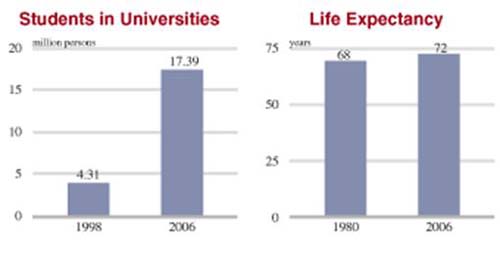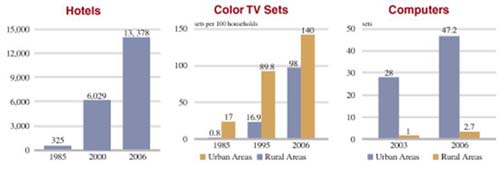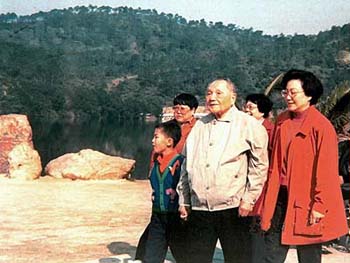Deng Yuwen, Associate Editor-in-Chief of Study Times affiliated to the Party School of the Central Committee of the Communist Party of China and a researcher of China’s reform and opening-up policy, discusses 30 years of reform:
The decision to begin reform and opening up, which was made at the Third Plenary Session of the 11th Central Committee of the Communist Party of China (CPC) in December 1978, has helped the Chinese people navigate through hard times and toward prosperity and rejuvenation in the past three decades.
During the course, the Chinese people have attained distinguished achievements and learned many lessons.
One outstanding achievement is that China's economic and comprehensive national strengths have been continuously enhanced and the living standards and welfare of the people have been further improved. China is currently the world's fourth largest economy in terms of gross domestic product (GDP), and will possibly overtake Germany to be the world's third largest in 2008. China now remains the world's third largest trader. Previously suffering shortages of many necessities, China today instead has excess production capacity on the whole. At the same time, living standards have been greatly improved and the people in general lead a comfortably well-off life. In 2006, China's per-capita GDP reached $2,000, and the rural population in abject poverty has decreased from 250 million in 1978 to 21.48 million at present, down from 30 percent to 2.3 percent of the country's total population, a remarkable achievement in the history of the world.
 |
Another important change has taken place in the mindset of the people. Opening up has brought a new vitality to the people's tedious and uniform lifestyle and way of thinking, which, dominated by the personality cult of political leaders for years, was against humanity. The people's spiritual and cultural life has been enriched to promote diversified thinking. Discussion of such concepts as competition, efficiency, democracy and rule of law had never been encouraged before reform and opening up. The Chinese people today are enjoying greater freedom in thinking, making choices on their own and deciding their own fate. Thanks to reform and opening up, the Chinese people are freer, more self-reliant and more independent. Revolutions in spiritual and intellectual life have mobilized hundreds of millions of people who devoted themselves with creativity and enthusiasm to China's socio-economic development.
In the past three decades, China has established a market economy and the market has replaced the government to play a decisive role in resource allocation and social development. China has gradually assimilated into the global mainstream during the decades of reform and opening up. The market economy and democracy have proven to be the most successful institutional creations in human civilization up to the present day. In its reforms and opening up, China has learned the merits of these creations, and voluntarily observed the common rules for the development of human society so as to overcome the flaws of traditional Chinese concepts of rules and to promote augmentation of national welfare and restore wealth and power for the country.
A review of China's history shows that the nation has been open, strong and prosperous during several feudal dynasties, but it never happened that the nation truly assimilated into the external world and shared the common progress. Especially after Western capitalism emerged and led to industrialization, China adopted a "closed-door" policy and remained an agricultural society for 200-odd years. Poverty-stricken and weak, the country eventually lapsed into persistent turbulence. The reform and opening up of the past 30 years represent the first "open-door" policy in its true sense in China's history: China not only learned from Western countries' technologies, but also their experience in developing a market economy and democracy as well as Western civilization, in order to carry out institutional reforms. China has successfully seized the opportunities of the third wave of globalization and effectively participated in international division of work to develop its economy. With its WTO membership, China is recognized today as a member of the global mainstream. It's commitments and credit in the capacity of a sovereign country warrant that China will adhere to the reform and opening-up policy in its future development.
In summarizing the experience of China's reform and opening-up program, some points should be stressed. First, reform theories should be updated and innovated in accordance with changes in practice in order to guide further reforms. Second, economic construction should be the central task of China's development, which has remained unchanged during the past 30 years under any circumstances. Third, it's wise to stick to the path of socialism, adhere to the CPC leadership and pay respect to reform innovations at the grass-roots level and by ordinary people while implementing the policy, which is conducive to effectively safeguarding the country's unification and social stability against the background of growing diversification of interests in China. Lastly, cultivating a market-oriented economy and implementing the opening-up policy at a gradual pace are needed, so as to ensure China's solid assimilation into the global mainstream.
First, economic growth was achieved at cost of environmental destruction and excessive consumption of resources. If it is safe to say that the economic achievements China has attained in the past 30 years would have taken a Western country a century to do, then it is equally safe to claim that the environmental destruction China has suffered during the period would take any Western country a century to encounter. China's sustainable development is endangered if no changes are made to its developmental model.
Second, the gap between the rich and the poor is widening. It took Japan and South Korea about 20 years to ascend into the club of developed countries in terms of national income. But in China, the overall national income, despite increases in the past 30 years, is still lagging behind many countries.
This is primarily because labor enjoys no preference in the nation's income allocation pattern, though China's huge population is another reason. The wealth created by the people has been transferred into capital and fiscal revenue, in the form of profit and tax, including those to importers in Western countries through granting exporters export subsidies. This imbalanced allocation has worsened the rich-poor gap in China.
Take the Gini index-an indicator of a country's overall income inequality-for example. China's Gini Coefficient index has reached 0.45, or the widely recognized warning boundary, in recent years. The Chinese people feel even stronger about the unfair disparity than people in other countries with similar ratios, as much of the disparity is attributed to monopolies and privilege in China. The government has failed to effectively protect the legitimate rights and interests of the laborers, who as a result can't share in the fruits of the national economic growth. At the initial stage of reform and opening up, China was short of capital but abundant in labor, and as a result, attracting foreign investment became an important task of local governments at all levels, as well as a standard to assess the performance and administrative achievements of officials. The rights and interests of workers, on the contrary, were neglected, and they don't have the rights to collectively negotiate over payment, not to mention all kinds of social rights such as welfare and insurance that are common in developed countries.
 |
China remains a low-income developing country despite the huge achievements it has made over the past 30 years. The basic knowledge, strategic plotting and policies drafted related to reform and opening up in the future should be based on the basic national condition that China remains a developing country in the primary stage of socialism, so that confronting emerging problems in reform and development can be understood. In the reform and opening-up drive in the coming years, the Chinese Government should adhere to its primary experience and fundamental policies of the past 30 years, continue to focus on economic development, promote the role of the market in resource distribution, and seek correct solutions of contradictions and problems that accrue in the process of socio-economic development.
 |
The root factor behind all these achievements, as Party General Secretary Hu Jintao emphasized in his report to the 17th National Congress of the CPC, is that China has followed the path of building socialism with Chinese characteristics and has formed a theoretical system of socialism with Chinese characteristics. A knowledge of China's basic national condition-the fact that China is at the primary stage of socialism and will remain so for a long time to come-is pertinent to understanding the essence of this theory. To recognize this fact indicates that China has eventually embarked on the road of seeking truth from facts and respecting objective laws.
Besides its achievements and experience, mistakes have also been made and there are lessons to be learned from these.
(Beijing Review January 7, 2008)





